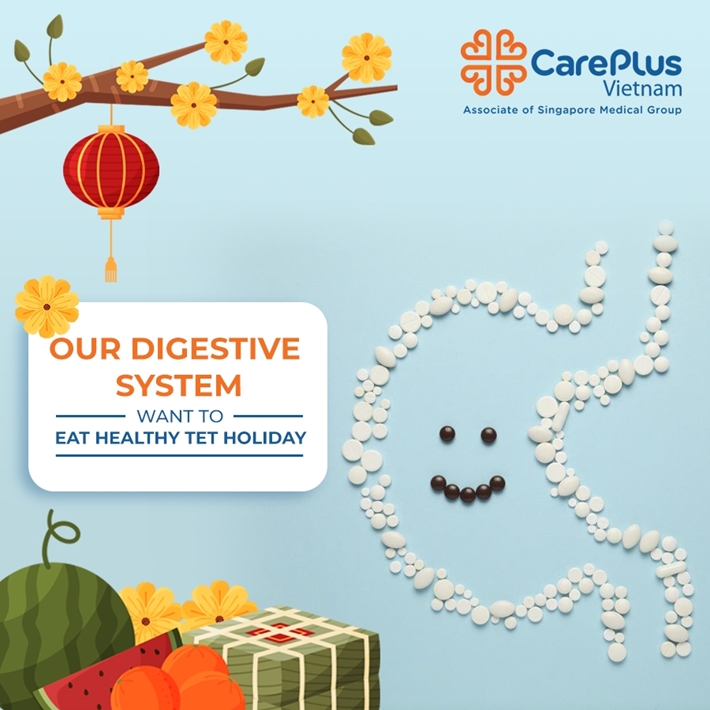Our Digestive System Wants to Have a Healthy New Year
Flatulence, heartburn, constipation, abdominal pain, diarrhea ... are one of the "New Year's diseases" that all of us have encountered. The digestive system is "unwell" meaning we eat but feel indigestion or experience bloating, heartburn, abdominal pain, diarrhea, constipation ...

1/28/2022 3:10:34 PM
1. Bloating, indigestion:
Commonly caused by eating foods containing a lot of protein, fat, fat, rich in energy, starch, sweets... making the stomach always in a state of flatulence, unable to digest.
To prevent, it is necessary to eat slowly, chew thoroughly, avoid talking a lot when eating, limit alcohol, carbonated water, increase eating green vegetables and fruits.
2. Sour:
If this condition occurs frequently, repeated can cause complications to the stomach. Particularly for people with peptic ulcer disease, in addition to heartburn, it is often accompanied by belching, abdominal pain in the epigastrium.
To prevent, fermented foods such as sauerkraut, pickles, spring rolls, pickles... should be limited. Especially for patients with stomach diseases, the condition is more likely to get worse when eating fermented foods.
3. Constipation:
On Tet holiday, most traditional dishes on Tet holiday are rich in protein & fat and low in fiber. So, if you do not balance your diet with all the groups of substances in a reasonable way, maintain exercise, practice the habit of defecating once a day, recommending at a specific time.
In case of difficulty in defecation, you need to go to the nearest medical facility for treatment (usually using laxatives). If left for a long time, it is easy to cause intestinal prolapse, hemorrhoids, anal fissures.
4. Abdominal pain:
For acute gastroenteritis: abdominal pain, accompanied by nausea, diarrhea in patients who are allergic to some specialty meats (snake, wild boar...) or foods containing preservatives, processed without carefully and for a long time.
For acute gastritis: epigastric pain accompanied by belching, heartburn, vomiting or nausea... The main cause is the abuse of too many stimulants (coffee, tobacco, alcohol...) or Eat spicy foods (pepper, chili…).
For acute pancreatitis: epigastric pain spreading to the back, sometimes sudden severe pain, accompanied by vomiting after a meal too full, greasy and fatty. When these signs are present, CarePlus needs to be treated promptly. In addition, acute pancreatitis is also seen in patients with a history of enteritis, pancreatitis due to hyperlipidemia, and alcoholic pancreatitis.
5. Diarrhea:
The foods that are not prepared and stored properly, or the foods that are reheated and eaten many times, are easy for bacteria to grow and cause diarrhea.
When diarrhea, should drink a lot of water or drink oresol rehydration solution (1 sachet mixed in 1 liter of drinking water within 24 hours - can be used from 2-3 packs/day). Absolutely, do not arbitrarily use anti-diarrheal drugs, antibiotics. It is best to see a doctor, depending on the severity of the disease, there is an appropriate treatment plan.
6. Liver disease:
One of the main causes of liver diseases is from the habit of drinking a lot of alcohol for a long time, especially the disease often seen during Tet when drinking a lot and continuously.
7. Hungry:
During Tet, we play more, so we may forget to eat or eat in moderation, at the right meal, not enough, leading to electrolyte disturbances, low blood sugar.
8. Food poisoning:
Food poisoning caused by improperly preserved food, or left for a long time contaminated with bacteria and bacterial toxins.
Even food containing toxic preservatives will cause "acute gastroenteritis" with abdominal pain above the navel accompanied by nausea and vomiting (acute gastritis caused by food poisoning). , or abdominal cramping below the navel or pain throughout the abdomen with watery stools, sputum, bloody stools, and possibly fever (acute enteritis caused by food poisoning).
In addition, patients may experience numbness, leg cramps due to loss of water and electrolytes (roughly called salt loss) in the body.
To prevent it, you need to use safe, hygienic, and properly preserved food; Eat and drink on time.
In addition, patients may experience numbness, leg cramps due to loss of water and electrolytes (roughly called salt loss) in the body.
To prevent it, you need to use safe, hygienic, and properly preserved food; eat on time and with enough groups of substances (sugar, protein, fat), increase vitamin and fiber supplements, eat slowly, chew well, practice the habit of defecating once a day and do not forget to maintain daily exercise. day to 'healthy liver - healthy pancreas - happy intestines' - repel diseases, avoid using strange foods, drinks or spices to which you have been allergic.
Therefore, to ensure safety, not to get sick, especially digestive diseases during Tet, you should pay attention to a healthy diet.